Code of Conduct - Australia and New Zealand Banking Group Limited
VerifiedAdded on 2022/08/25
|11
|2714
|16
AI Summary
Contribute Materials
Your contribution can guide someone’s learning journey. Share your
documents today.
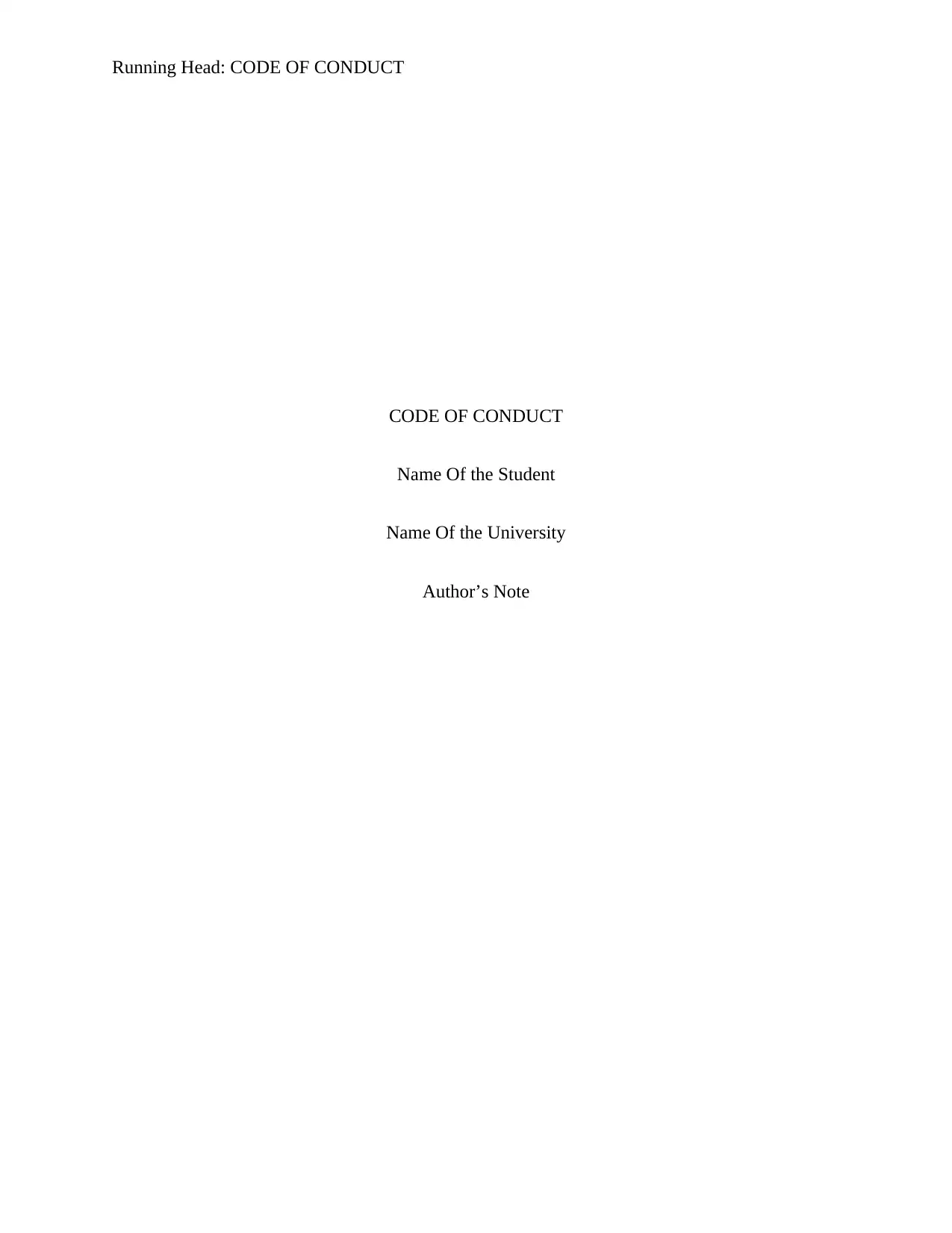
Running Head: CODE OF CONDUCT
CODE OF CONDUCT
Name Of the Student
Name Of the University
Author’s Note
CODE OF CONDUCT
Name Of the Student
Name Of the University
Author’s Note
Secure Best Marks with AI Grader
Need help grading? Try our AI Grader for instant feedback on your assignments.
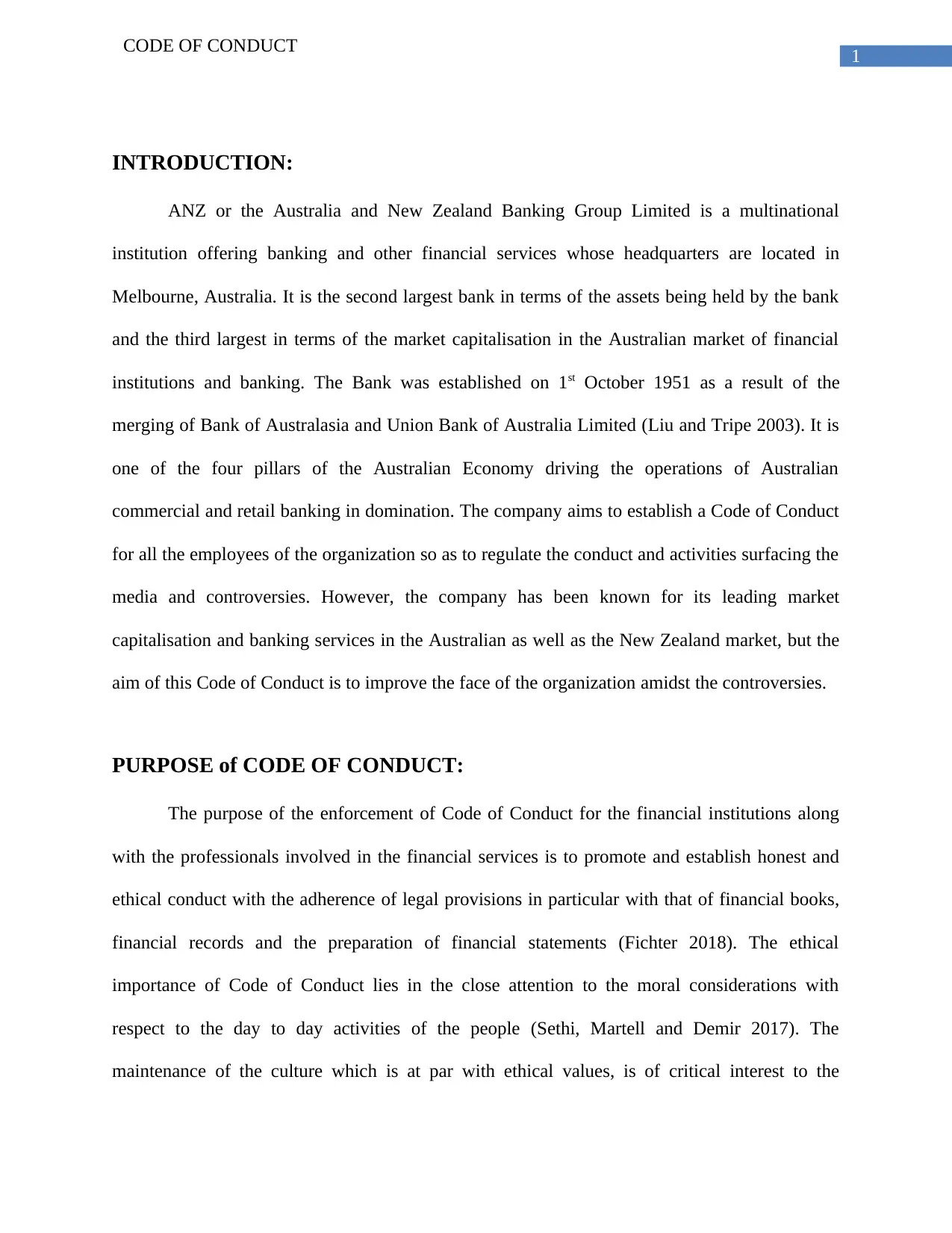
1
CODE OF CONDUCT
INTRODUCTION:
ANZ or the Australia and New Zealand Banking Group Limited is a multinational
institution offering banking and other financial services whose headquarters are located in
Melbourne, Australia. It is the second largest bank in terms of the assets being held by the bank
and the third largest in terms of the market capitalisation in the Australian market of financial
institutions and banking. The Bank was established on 1st October 1951 as a result of the
merging of Bank of Australasia and Union Bank of Australia Limited (Liu and Tripe 2003). It is
one of the four pillars of the Australian Economy driving the operations of Australian
commercial and retail banking in domination. The company aims to establish a Code of Conduct
for all the employees of the organization so as to regulate the conduct and activities surfacing the
media and controversies. However, the company has been known for its leading market
capitalisation and banking services in the Australian as well as the New Zealand market, but the
aim of this Code of Conduct is to improve the face of the organization amidst the controversies.
PURPOSE of CODE OF CONDUCT:
The purpose of the enforcement of Code of Conduct for the financial institutions along
with the professionals involved in the financial services is to promote and establish honest and
ethical conduct with the adherence of legal provisions in particular with that of financial books,
financial records and the preparation of financial statements (Fichter 2018). The ethical
importance of Code of Conduct lies in the close attention to the moral considerations with
respect to the day to day activities of the people (Sethi, Martell and Demir 2017). The
maintenance of the culture which is at par with ethical values, is of critical interest to the
CODE OF CONDUCT
INTRODUCTION:
ANZ or the Australia and New Zealand Banking Group Limited is a multinational
institution offering banking and other financial services whose headquarters are located in
Melbourne, Australia. It is the second largest bank in terms of the assets being held by the bank
and the third largest in terms of the market capitalisation in the Australian market of financial
institutions and banking. The Bank was established on 1st October 1951 as a result of the
merging of Bank of Australasia and Union Bank of Australia Limited (Liu and Tripe 2003). It is
one of the four pillars of the Australian Economy driving the operations of Australian
commercial and retail banking in domination. The company aims to establish a Code of Conduct
for all the employees of the organization so as to regulate the conduct and activities surfacing the
media and controversies. However, the company has been known for its leading market
capitalisation and banking services in the Australian as well as the New Zealand market, but the
aim of this Code of Conduct is to improve the face of the organization amidst the controversies.
PURPOSE of CODE OF CONDUCT:
The purpose of the enforcement of Code of Conduct for the financial institutions along
with the professionals involved in the financial services is to promote and establish honest and
ethical conduct with the adherence of legal provisions in particular with that of financial books,
financial records and the preparation of financial statements (Fichter 2018). The ethical
importance of Code of Conduct lies in the close attention to the moral considerations with
respect to the day to day activities of the people (Sethi, Martell and Demir 2017). The
maintenance of the culture which is at par with ethical values, is of critical interest to the
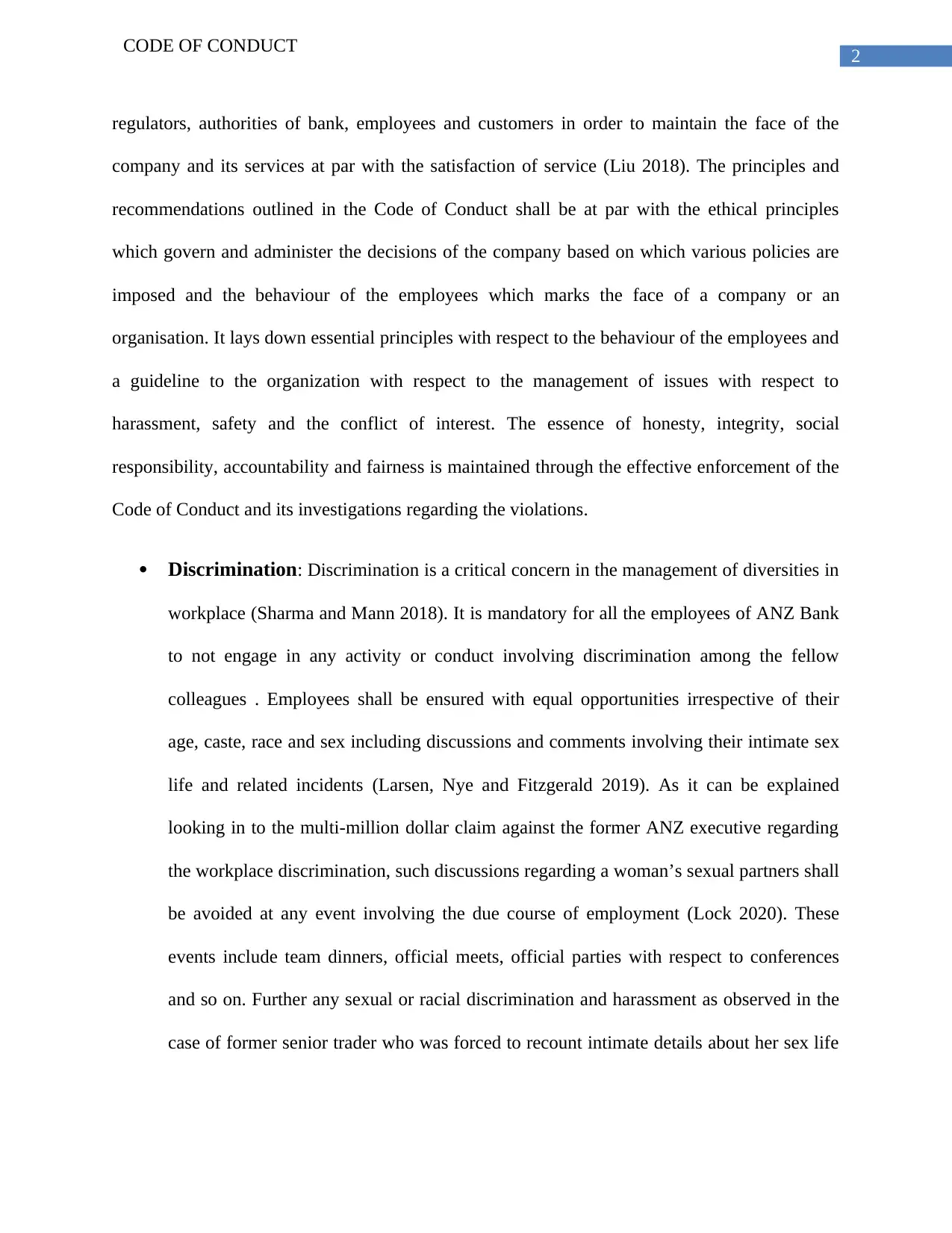
2
CODE OF CONDUCT
regulators, authorities of bank, employees and customers in order to maintain the face of the
company and its services at par with the satisfaction of service (Liu 2018). The principles and
recommendations outlined in the Code of Conduct shall be at par with the ethical principles
which govern and administer the decisions of the company based on which various policies are
imposed and the behaviour of the employees which marks the face of a company or an
organisation. It lays down essential principles with respect to the behaviour of the employees and
a guideline to the organization with respect to the management of issues with respect to
harassment, safety and the conflict of interest. The essence of honesty, integrity, social
responsibility, accountability and fairness is maintained through the effective enforcement of the
Code of Conduct and its investigations regarding the violations.
Discrimination: Discrimination is a critical concern in the management of diversities in
workplace (Sharma and Mann 2018). It is mandatory for all the employees of ANZ Bank
to not engage in any activity or conduct involving discrimination among the fellow
colleagues . Employees shall be ensured with equal opportunities irrespective of their
age, caste, race and sex including discussions and comments involving their intimate sex
life and related incidents (Larsen, Nye and Fitzgerald 2019). As it can be explained
looking in to the multi-million dollar claim against the former ANZ executive regarding
the workplace discrimination, such discussions regarding a woman’s sexual partners shall
be avoided at any event involving the due course of employment (Lock 2020). These
events include team dinners, official meets, official parties with respect to conferences
and so on. Further any sexual or racial discrimination and harassment as observed in the
case of former senior trader who was forced to recount intimate details about her sex life
CODE OF CONDUCT
regulators, authorities of bank, employees and customers in order to maintain the face of the
company and its services at par with the satisfaction of service (Liu 2018). The principles and
recommendations outlined in the Code of Conduct shall be at par with the ethical principles
which govern and administer the decisions of the company based on which various policies are
imposed and the behaviour of the employees which marks the face of a company or an
organisation. It lays down essential principles with respect to the behaviour of the employees and
a guideline to the organization with respect to the management of issues with respect to
harassment, safety and the conflict of interest. The essence of honesty, integrity, social
responsibility, accountability and fairness is maintained through the effective enforcement of the
Code of Conduct and its investigations regarding the violations.
Discrimination: Discrimination is a critical concern in the management of diversities in
workplace (Sharma and Mann 2018). It is mandatory for all the employees of ANZ Bank
to not engage in any activity or conduct involving discrimination among the fellow
colleagues . Employees shall be ensured with equal opportunities irrespective of their
age, caste, race and sex including discussions and comments involving their intimate sex
life and related incidents (Larsen, Nye and Fitzgerald 2019). As it can be explained
looking in to the multi-million dollar claim against the former ANZ executive regarding
the workplace discrimination, such discussions regarding a woman’s sexual partners shall
be avoided at any event involving the due course of employment (Lock 2020). These
events include team dinners, official meets, official parties with respect to conferences
and so on. Further any sexual or racial discrimination and harassment as observed in the
case of former senior trader who was forced to recount intimate details about her sex life
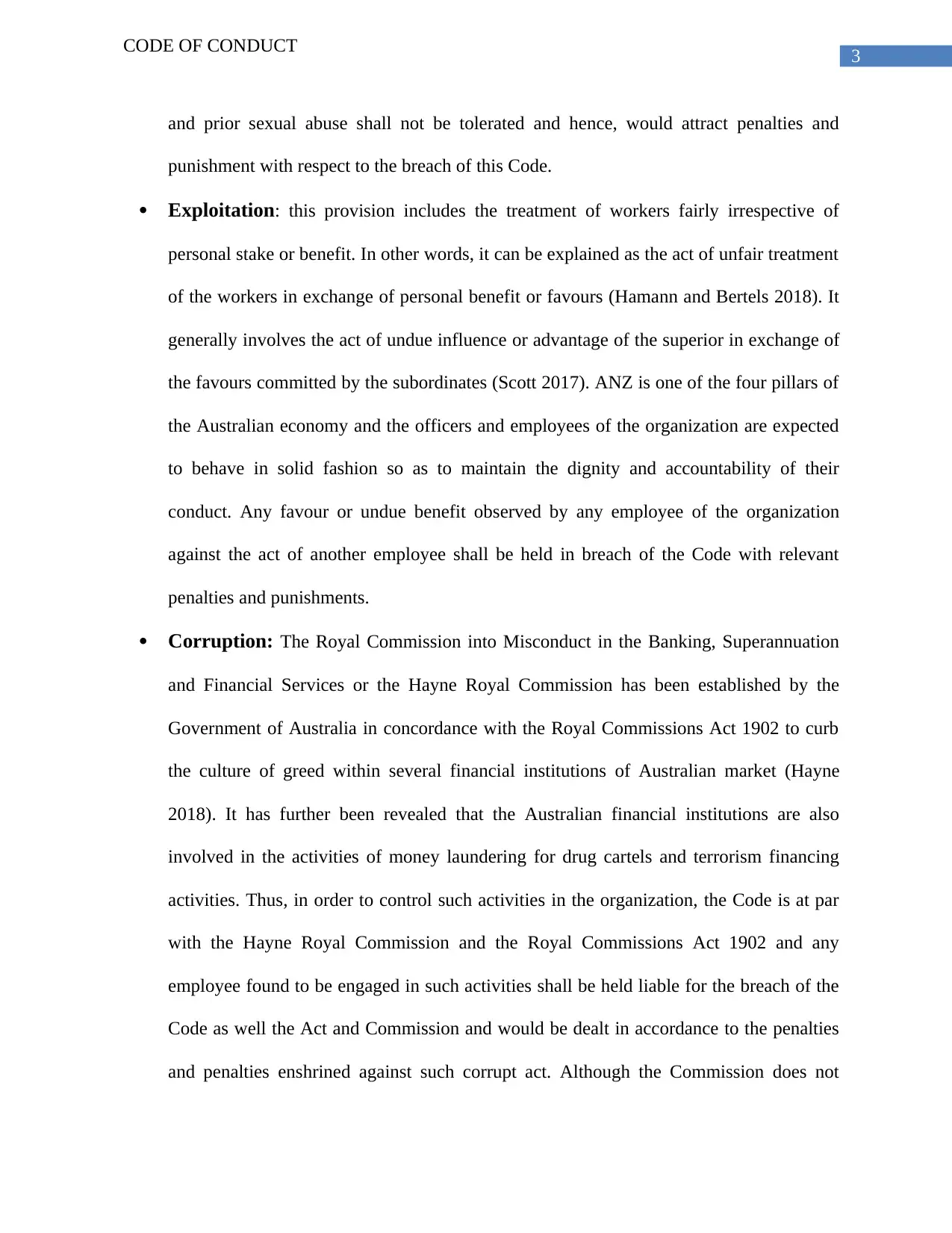
3
CODE OF CONDUCT
and prior sexual abuse shall not be tolerated and hence, would attract penalties and
punishment with respect to the breach of this Code.
Exploitation: this provision includes the treatment of workers fairly irrespective of
personal stake or benefit. In other words, it can be explained as the act of unfair treatment
of the workers in exchange of personal benefit or favours (Hamann and Bertels 2018). It
generally involves the act of undue influence or advantage of the superior in exchange of
the favours committed by the subordinates (Scott 2017). ANZ is one of the four pillars of
the Australian economy and the officers and employees of the organization are expected
to behave in solid fashion so as to maintain the dignity and accountability of their
conduct. Any favour or undue benefit observed by any employee of the organization
against the act of another employee shall be held in breach of the Code with relevant
penalties and punishments.
Corruption: The Royal Commission into Misconduct in the Banking, Superannuation
and Financial Services or the Hayne Royal Commission has been established by the
Government of Australia in concordance with the Royal Commissions Act 1902 to curb
the culture of greed within several financial institutions of Australian market (Hayne
2018). It has further been revealed that the Australian financial institutions are also
involved in the activities of money laundering for drug cartels and terrorism financing
activities. Thus, in order to control such activities in the organization, the Code is at par
with the Hayne Royal Commission and the Royal Commissions Act 1902 and any
employee found to be engaged in such activities shall be held liable for the breach of the
Code as well the Act and Commission and would be dealt in accordance to the penalties
and penalties enshrined against such corrupt act. Although the Commission does not
CODE OF CONDUCT
and prior sexual abuse shall not be tolerated and hence, would attract penalties and
punishment with respect to the breach of this Code.
Exploitation: this provision includes the treatment of workers fairly irrespective of
personal stake or benefit. In other words, it can be explained as the act of unfair treatment
of the workers in exchange of personal benefit or favours (Hamann and Bertels 2018). It
generally involves the act of undue influence or advantage of the superior in exchange of
the favours committed by the subordinates (Scott 2017). ANZ is one of the four pillars of
the Australian economy and the officers and employees of the organization are expected
to behave in solid fashion so as to maintain the dignity and accountability of their
conduct. Any favour or undue benefit observed by any employee of the organization
against the act of another employee shall be held in breach of the Code with relevant
penalties and punishments.
Corruption: The Royal Commission into Misconduct in the Banking, Superannuation
and Financial Services or the Hayne Royal Commission has been established by the
Government of Australia in concordance with the Royal Commissions Act 1902 to curb
the culture of greed within several financial institutions of Australian market (Hayne
2018). It has further been revealed that the Australian financial institutions are also
involved in the activities of money laundering for drug cartels and terrorism financing
activities. Thus, in order to control such activities in the organization, the Code is at par
with the Hayne Royal Commission and the Royal Commissions Act 1902 and any
employee found to be engaged in such activities shall be held liable for the breach of the
Code as well the Act and Commission and would be dealt in accordance to the penalties
and penalties enshrined against such corrupt act. Although the Commission does not
Secure Best Marks with AI Grader
Need help grading? Try our AI Grader for instant feedback on your assignments.
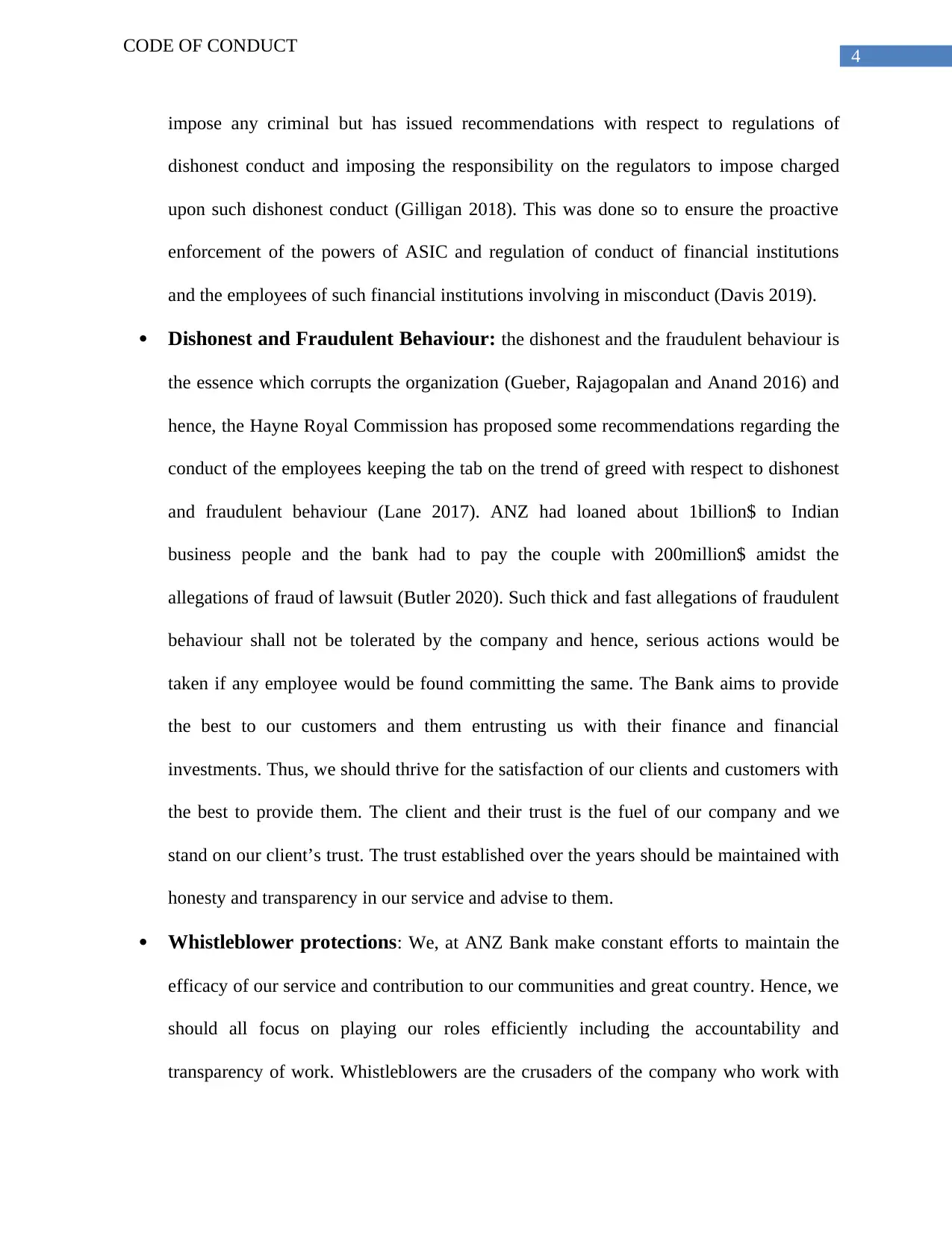
4
CODE OF CONDUCT
impose any criminal but has issued recommendations with respect to regulations of
dishonest conduct and imposing the responsibility on the regulators to impose charged
upon such dishonest conduct (Gilligan 2018). This was done so to ensure the proactive
enforcement of the powers of ASIC and regulation of conduct of financial institutions
and the employees of such financial institutions involving in misconduct (Davis 2019).
Dishonest and Fraudulent Behaviour: the dishonest and the fraudulent behaviour is
the essence which corrupts the organization (Gueber, Rajagopalan and Anand 2016) and
hence, the Hayne Royal Commission has proposed some recommendations regarding the
conduct of the employees keeping the tab on the trend of greed with respect to dishonest
and fraudulent behaviour (Lane 2017). ANZ had loaned about 1billion$ to Indian
business people and the bank had to pay the couple with 200million$ amidst the
allegations of fraud of lawsuit (Butler 2020). Such thick and fast allegations of fraudulent
behaviour shall not be tolerated by the company and hence, serious actions would be
taken if any employee would be found committing the same. The Bank aims to provide
the best to our customers and them entrusting us with their finance and financial
investments. Thus, we should thrive for the satisfaction of our clients and customers with
the best to provide them. The client and their trust is the fuel of our company and we
stand on our client’s trust. The trust established over the years should be maintained with
honesty and transparency in our service and advise to them.
Whistleblower protections: We, at ANZ Bank make constant efforts to maintain the
efficacy of our service and contribution to our communities and great country. Hence, we
should all focus on playing our roles efficiently including the accountability and
transparency of work. Whistleblowers are the crusaders of the company who work with
CODE OF CONDUCT
impose any criminal but has issued recommendations with respect to regulations of
dishonest conduct and imposing the responsibility on the regulators to impose charged
upon such dishonest conduct (Gilligan 2018). This was done so to ensure the proactive
enforcement of the powers of ASIC and regulation of conduct of financial institutions
and the employees of such financial institutions involving in misconduct (Davis 2019).
Dishonest and Fraudulent Behaviour: the dishonest and the fraudulent behaviour is
the essence which corrupts the organization (Gueber, Rajagopalan and Anand 2016) and
hence, the Hayne Royal Commission has proposed some recommendations regarding the
conduct of the employees keeping the tab on the trend of greed with respect to dishonest
and fraudulent behaviour (Lane 2017). ANZ had loaned about 1billion$ to Indian
business people and the bank had to pay the couple with 200million$ amidst the
allegations of fraud of lawsuit (Butler 2020). Such thick and fast allegations of fraudulent
behaviour shall not be tolerated by the company and hence, serious actions would be
taken if any employee would be found committing the same. The Bank aims to provide
the best to our customers and them entrusting us with their finance and financial
investments. Thus, we should thrive for the satisfaction of our clients and customers with
the best to provide them. The client and their trust is the fuel of our company and we
stand on our client’s trust. The trust established over the years should be maintained with
honesty and transparency in our service and advise to them.
Whistleblower protections: We, at ANZ Bank make constant efforts to maintain the
efficacy of our service and contribution to our communities and great country. Hence, we
should all focus on playing our roles efficiently including the accountability and
transparency of work. Whistleblowers are the crusaders of the company who work with
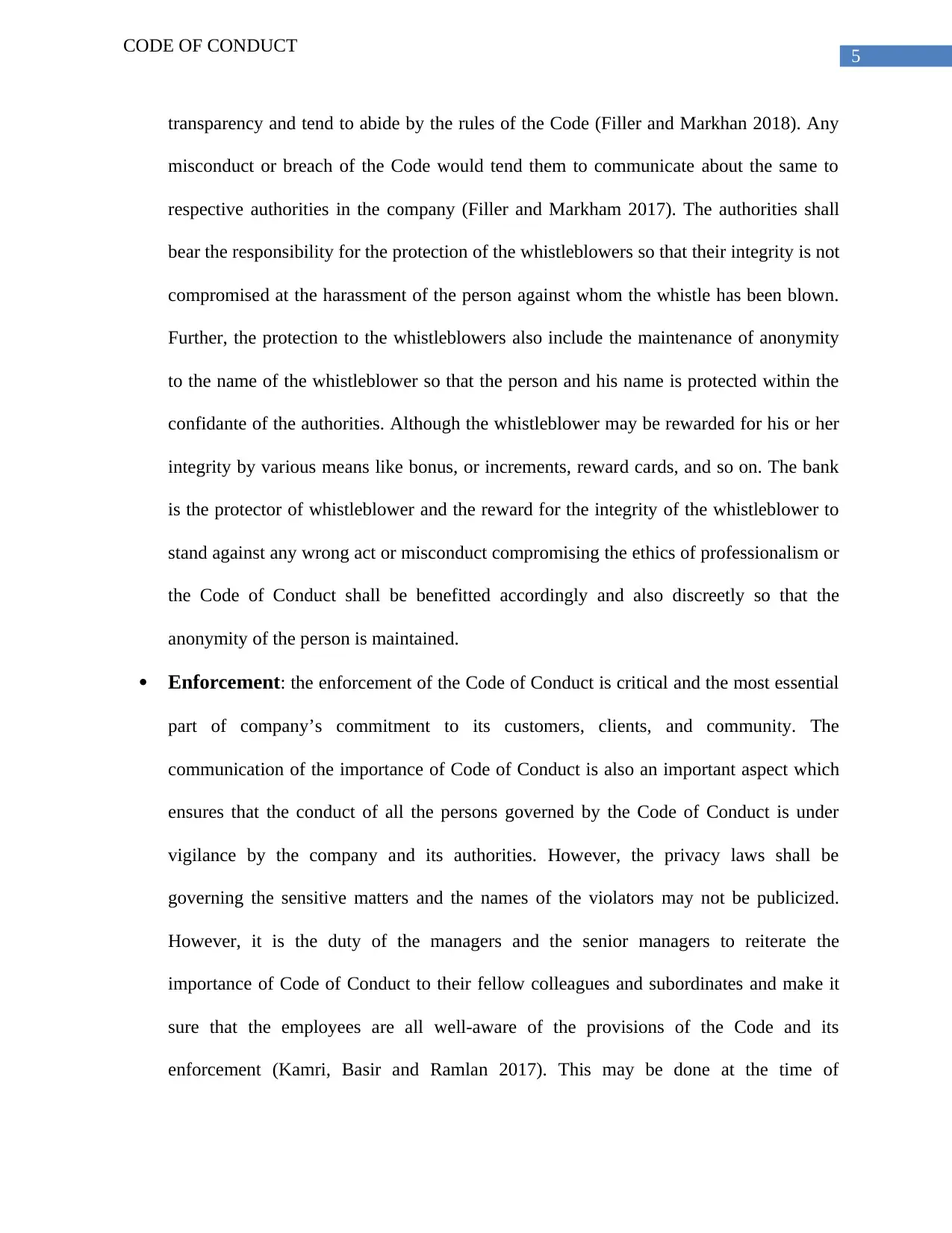
5
CODE OF CONDUCT
transparency and tend to abide by the rules of the Code (Filler and Markhan 2018). Any
misconduct or breach of the Code would tend them to communicate about the same to
respective authorities in the company (Filler and Markham 2017). The authorities shall
bear the responsibility for the protection of the whistleblowers so that their integrity is not
compromised at the harassment of the person against whom the whistle has been blown.
Further, the protection to the whistleblowers also include the maintenance of anonymity
to the name of the whistleblower so that the person and his name is protected within the
confidante of the authorities. Although the whistleblower may be rewarded for his or her
integrity by various means like bonus, or increments, reward cards, and so on. The bank
is the protector of whistleblower and the reward for the integrity of the whistleblower to
stand against any wrong act or misconduct compromising the ethics of professionalism or
the Code of Conduct shall be benefitted accordingly and also discreetly so that the
anonymity of the person is maintained.
Enforcement: the enforcement of the Code of Conduct is critical and the most essential
part of company’s commitment to its customers, clients, and community. The
communication of the importance of Code of Conduct is also an important aspect which
ensures that the conduct of all the persons governed by the Code of Conduct is under
vigilance by the company and its authorities. However, the privacy laws shall be
governing the sensitive matters and the names of the violators may not be publicized.
However, it is the duty of the managers and the senior managers to reiterate the
importance of Code of Conduct to their fellow colleagues and subordinates and make it
sure that the employees are all well-aware of the provisions of the Code and its
enforcement (Kamri, Basir and Ramlan 2017). This may be done at the time of
CODE OF CONDUCT
transparency and tend to abide by the rules of the Code (Filler and Markhan 2018). Any
misconduct or breach of the Code would tend them to communicate about the same to
respective authorities in the company (Filler and Markham 2017). The authorities shall
bear the responsibility for the protection of the whistleblowers so that their integrity is not
compromised at the harassment of the person against whom the whistle has been blown.
Further, the protection to the whistleblowers also include the maintenance of anonymity
to the name of the whistleblower so that the person and his name is protected within the
confidante of the authorities. Although the whistleblower may be rewarded for his or her
integrity by various means like bonus, or increments, reward cards, and so on. The bank
is the protector of whistleblower and the reward for the integrity of the whistleblower to
stand against any wrong act or misconduct compromising the ethics of professionalism or
the Code of Conduct shall be benefitted accordingly and also discreetly so that the
anonymity of the person is maintained.
Enforcement: the enforcement of the Code of Conduct is critical and the most essential
part of company’s commitment to its customers, clients, and community. The
communication of the importance of Code of Conduct is also an important aspect which
ensures that the conduct of all the persons governed by the Code of Conduct is under
vigilance by the company and its authorities. However, the privacy laws shall be
governing the sensitive matters and the names of the violators may not be publicized.
However, it is the duty of the managers and the senior managers to reiterate the
importance of Code of Conduct to their fellow colleagues and subordinates and make it
sure that the employees are all well-aware of the provisions of the Code and its
enforcement (Kamri, Basir and Ramlan 2017). This may be done at the time of
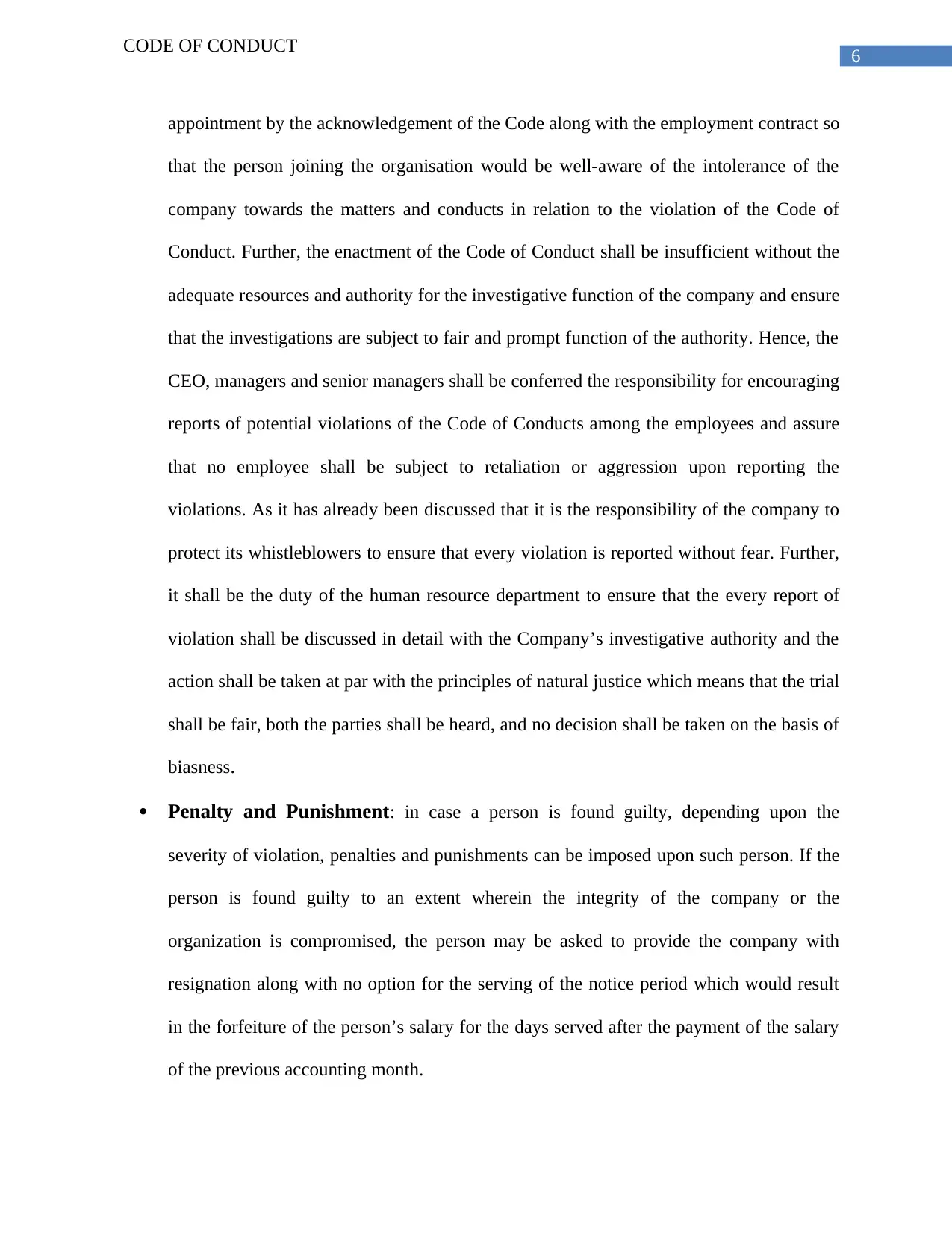
6
CODE OF CONDUCT
appointment by the acknowledgement of the Code along with the employment contract so
that the person joining the organisation would be well-aware of the intolerance of the
company towards the matters and conducts in relation to the violation of the Code of
Conduct. Further, the enactment of the Code of Conduct shall be insufficient without the
adequate resources and authority for the investigative function of the company and ensure
that the investigations are subject to fair and prompt function of the authority. Hence, the
CEO, managers and senior managers shall be conferred the responsibility for encouraging
reports of potential violations of the Code of Conducts among the employees and assure
that no employee shall be subject to retaliation or aggression upon reporting the
violations. As it has already been discussed that it is the responsibility of the company to
protect its whistleblowers to ensure that every violation is reported without fear. Further,
it shall be the duty of the human resource department to ensure that the every report of
violation shall be discussed in detail with the Company’s investigative authority and the
action shall be taken at par with the principles of natural justice which means that the trial
shall be fair, both the parties shall be heard, and no decision shall be taken on the basis of
biasness.
Penalty and Punishment: in case a person is found guilty, depending upon the
severity of violation, penalties and punishments can be imposed upon such person. If the
person is found guilty to an extent wherein the integrity of the company or the
organization is compromised, the person may be asked to provide the company with
resignation along with no option for the serving of the notice period which would result
in the forfeiture of the person’s salary for the days served after the payment of the salary
of the previous accounting month.
CODE OF CONDUCT
appointment by the acknowledgement of the Code along with the employment contract so
that the person joining the organisation would be well-aware of the intolerance of the
company towards the matters and conducts in relation to the violation of the Code of
Conduct. Further, the enactment of the Code of Conduct shall be insufficient without the
adequate resources and authority for the investigative function of the company and ensure
that the investigations are subject to fair and prompt function of the authority. Hence, the
CEO, managers and senior managers shall be conferred the responsibility for encouraging
reports of potential violations of the Code of Conducts among the employees and assure
that no employee shall be subject to retaliation or aggression upon reporting the
violations. As it has already been discussed that it is the responsibility of the company to
protect its whistleblowers to ensure that every violation is reported without fear. Further,
it shall be the duty of the human resource department to ensure that the every report of
violation shall be discussed in detail with the Company’s investigative authority and the
action shall be taken at par with the principles of natural justice which means that the trial
shall be fair, both the parties shall be heard, and no decision shall be taken on the basis of
biasness.
Penalty and Punishment: in case a person is found guilty, depending upon the
severity of violation, penalties and punishments can be imposed upon such person. If the
person is found guilty to an extent wherein the integrity of the company or the
organization is compromised, the person may be asked to provide the company with
resignation along with no option for the serving of the notice period which would result
in the forfeiture of the person’s salary for the days served after the payment of the salary
of the previous accounting month.
Paraphrase This Document
Need a fresh take? Get an instant paraphrase of this document with our AI Paraphraser
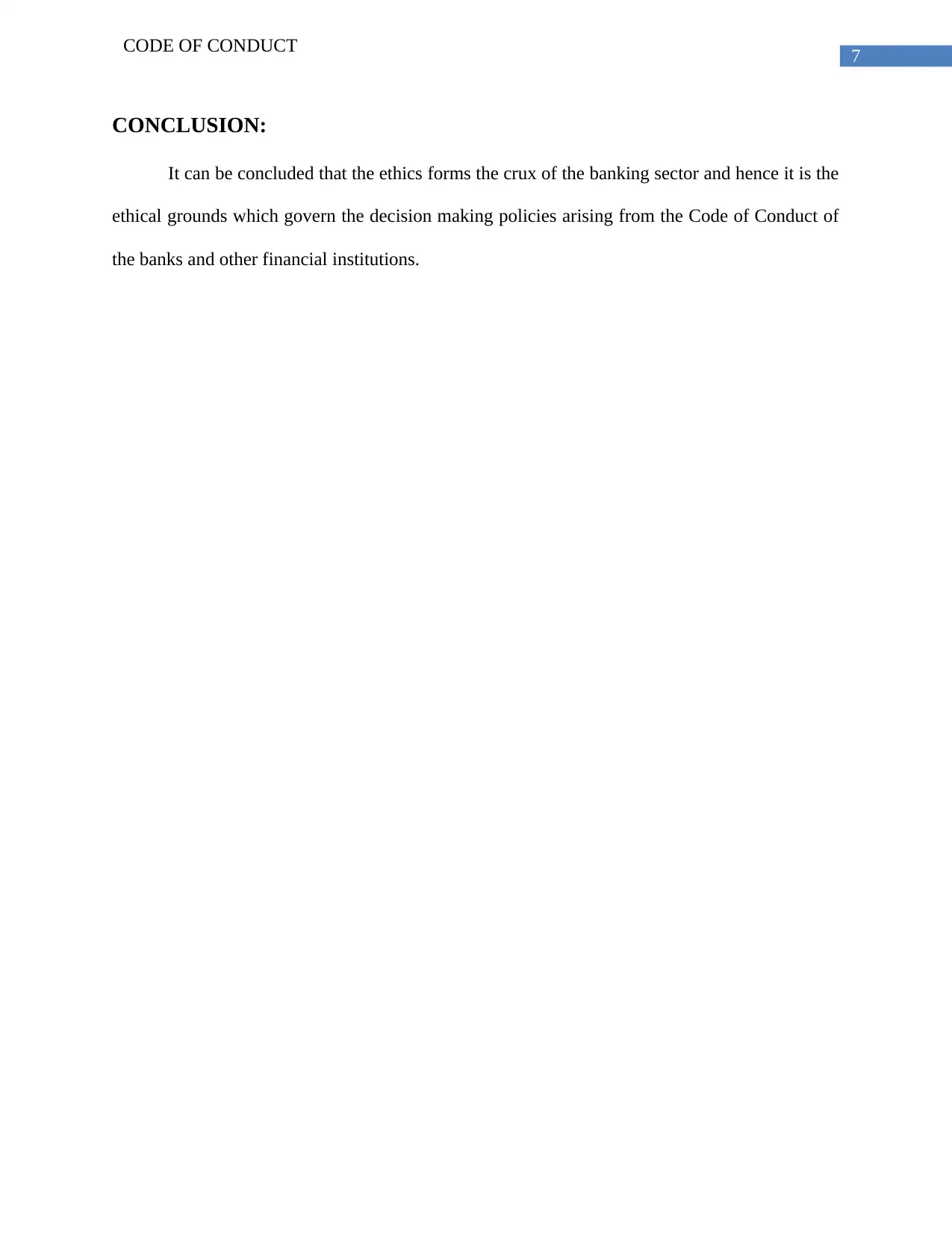
7
CODE OF CONDUCT
CONCLUSION:
It can be concluded that the ethics forms the crux of the banking sector and hence it is the
ethical grounds which govern the decision making policies arising from the Code of Conduct of
the banks and other financial institutions.
CODE OF CONDUCT
CONCLUSION:
It can be concluded that the ethics forms the crux of the banking sector and hence it is the
ethical grounds which govern the decision making policies arising from the Code of Conduct of
the banks and other financial institutions.
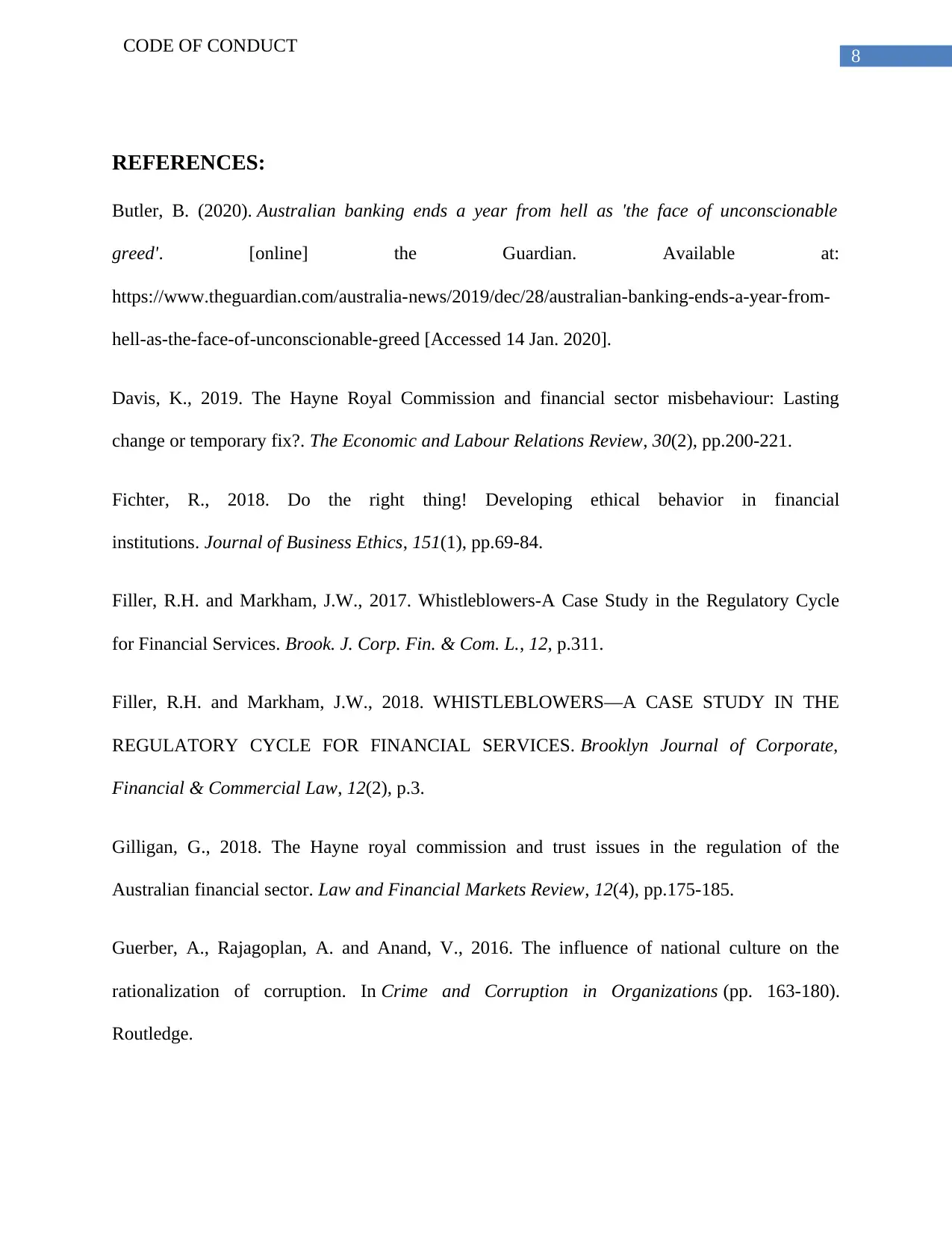
8
CODE OF CONDUCT
REFERENCES:
Butler, B. (2020). Australian banking ends a year from hell as 'the face of unconscionable
greed'. [online] the Guardian. Available at:
https://www.theguardian.com/australia-news/2019/dec/28/australian-banking-ends-a-year-from-
hell-as-the-face-of-unconscionable-greed [Accessed 14 Jan. 2020].
Davis, K., 2019. The Hayne Royal Commission and financial sector misbehaviour: Lasting
change or temporary fix?. The Economic and Labour Relations Review, 30(2), pp.200-221.
Fichter, R., 2018. Do the right thing! Developing ethical behavior in financial
institutions. Journal of Business Ethics, 151(1), pp.69-84.
Filler, R.H. and Markham, J.W., 2017. Whistleblowers-A Case Study in the Regulatory Cycle
for Financial Services. Brook. J. Corp. Fin. & Com. L., 12, p.311.
Filler, R.H. and Markham, J.W., 2018. WHISTLEBLOWERS—A CASE STUDY IN THE
REGULATORY CYCLE FOR FINANCIAL SERVICES. Brooklyn Journal of Corporate,
Financial & Commercial Law, 12(2), p.3.
Gilligan, G., 2018. The Hayne royal commission and trust issues in the regulation of the
Australian financial sector. Law and Financial Markets Review, 12(4), pp.175-185.
Guerber, A., Rajagoplan, A. and Anand, V., 2016. The influence of national culture on the
rationalization of corruption. In Crime and Corruption in Organizations (pp. 163-180).
Routledge.
CODE OF CONDUCT
REFERENCES:
Butler, B. (2020). Australian banking ends a year from hell as 'the face of unconscionable
greed'. [online] the Guardian. Available at:
https://www.theguardian.com/australia-news/2019/dec/28/australian-banking-ends-a-year-from-
hell-as-the-face-of-unconscionable-greed [Accessed 14 Jan. 2020].
Davis, K., 2019. The Hayne Royal Commission and financial sector misbehaviour: Lasting
change or temporary fix?. The Economic and Labour Relations Review, 30(2), pp.200-221.
Fichter, R., 2018. Do the right thing! Developing ethical behavior in financial
institutions. Journal of Business Ethics, 151(1), pp.69-84.
Filler, R.H. and Markham, J.W., 2017. Whistleblowers-A Case Study in the Regulatory Cycle
for Financial Services. Brook. J. Corp. Fin. & Com. L., 12, p.311.
Filler, R.H. and Markham, J.W., 2018. WHISTLEBLOWERS—A CASE STUDY IN THE
REGULATORY CYCLE FOR FINANCIAL SERVICES. Brooklyn Journal of Corporate,
Financial & Commercial Law, 12(2), p.3.
Gilligan, G., 2018. The Hayne royal commission and trust issues in the regulation of the
Australian financial sector. Law and Financial Markets Review, 12(4), pp.175-185.
Guerber, A., Rajagoplan, A. and Anand, V., 2016. The influence of national culture on the
rationalization of corruption. In Crime and Corruption in Organizations (pp. 163-180).
Routledge.
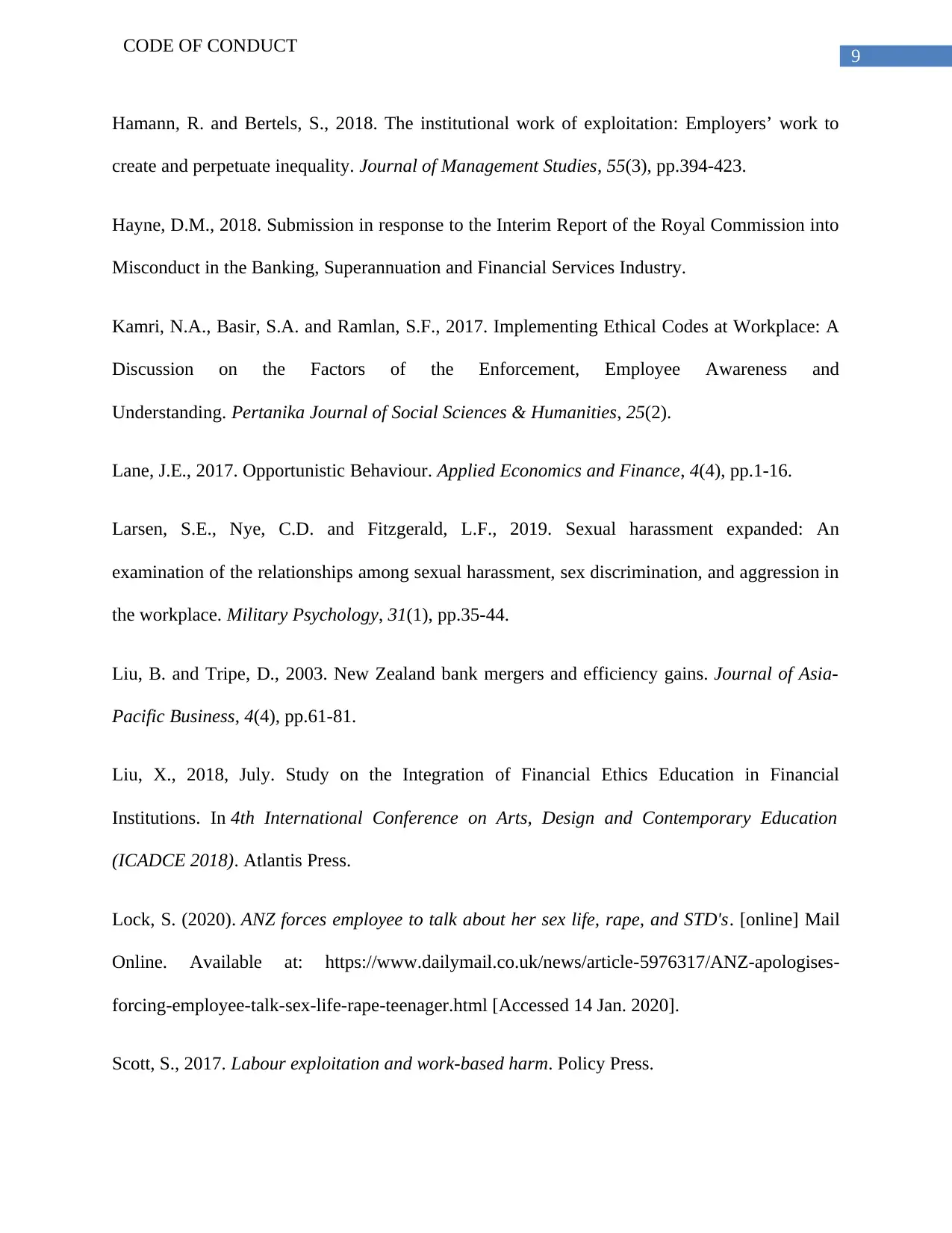
9
CODE OF CONDUCT
Hamann, R. and Bertels, S., 2018. The institutional work of exploitation: Employers’ work to
create and perpetuate inequality. Journal of Management Studies, 55(3), pp.394-423.
Hayne, D.M., 2018. Submission in response to the Interim Report of the Royal Commission into
Misconduct in the Banking, Superannuation and Financial Services Industry.
Kamri, N.A., Basir, S.A. and Ramlan, S.F., 2017. Implementing Ethical Codes at Workplace: A
Discussion on the Factors of the Enforcement, Employee Awareness and
Understanding. Pertanika Journal of Social Sciences & Humanities, 25(2).
Lane, J.E., 2017. Opportunistic Behaviour. Applied Economics and Finance, 4(4), pp.1-16.
Larsen, S.E., Nye, C.D. and Fitzgerald, L.F., 2019. Sexual harassment expanded: An
examination of the relationships among sexual harassment, sex discrimination, and aggression in
the workplace. Military Psychology, 31(1), pp.35-44.
Liu, B. and Tripe, D., 2003. New Zealand bank mergers and efficiency gains. Journal of Asia-
Pacific Business, 4(4), pp.61-81.
Liu, X., 2018, July. Study on the Integration of Financial Ethics Education in Financial
Institutions. In 4th International Conference on Arts, Design and Contemporary Education
(ICADCE 2018). Atlantis Press.
Lock, S. (2020). ANZ forces employee to talk about her sex life, rape, and STD's. [online] Mail
Online. Available at: https://www.dailymail.co.uk/news/article-5976317/ANZ-apologises-
forcing-employee-talk-sex-life-rape-teenager.html [Accessed 14 Jan. 2020].
Scott, S., 2017. Labour exploitation and work-based harm. Policy Press.
CODE OF CONDUCT
Hamann, R. and Bertels, S., 2018. The institutional work of exploitation: Employers’ work to
create and perpetuate inequality. Journal of Management Studies, 55(3), pp.394-423.
Hayne, D.M., 2018. Submission in response to the Interim Report of the Royal Commission into
Misconduct in the Banking, Superannuation and Financial Services Industry.
Kamri, N.A., Basir, S.A. and Ramlan, S.F., 2017. Implementing Ethical Codes at Workplace: A
Discussion on the Factors of the Enforcement, Employee Awareness and
Understanding. Pertanika Journal of Social Sciences & Humanities, 25(2).
Lane, J.E., 2017. Opportunistic Behaviour. Applied Economics and Finance, 4(4), pp.1-16.
Larsen, S.E., Nye, C.D. and Fitzgerald, L.F., 2019. Sexual harassment expanded: An
examination of the relationships among sexual harassment, sex discrimination, and aggression in
the workplace. Military Psychology, 31(1), pp.35-44.
Liu, B. and Tripe, D., 2003. New Zealand bank mergers and efficiency gains. Journal of Asia-
Pacific Business, 4(4), pp.61-81.
Liu, X., 2018, July. Study on the Integration of Financial Ethics Education in Financial
Institutions. In 4th International Conference on Arts, Design and Contemporary Education
(ICADCE 2018). Atlantis Press.
Lock, S. (2020). ANZ forces employee to talk about her sex life, rape, and STD's. [online] Mail
Online. Available at: https://www.dailymail.co.uk/news/article-5976317/ANZ-apologises-
forcing-employee-talk-sex-life-rape-teenager.html [Accessed 14 Jan. 2020].
Scott, S., 2017. Labour exploitation and work-based harm. Policy Press.
Secure Best Marks with AI Grader
Need help grading? Try our AI Grader for instant feedback on your assignments.
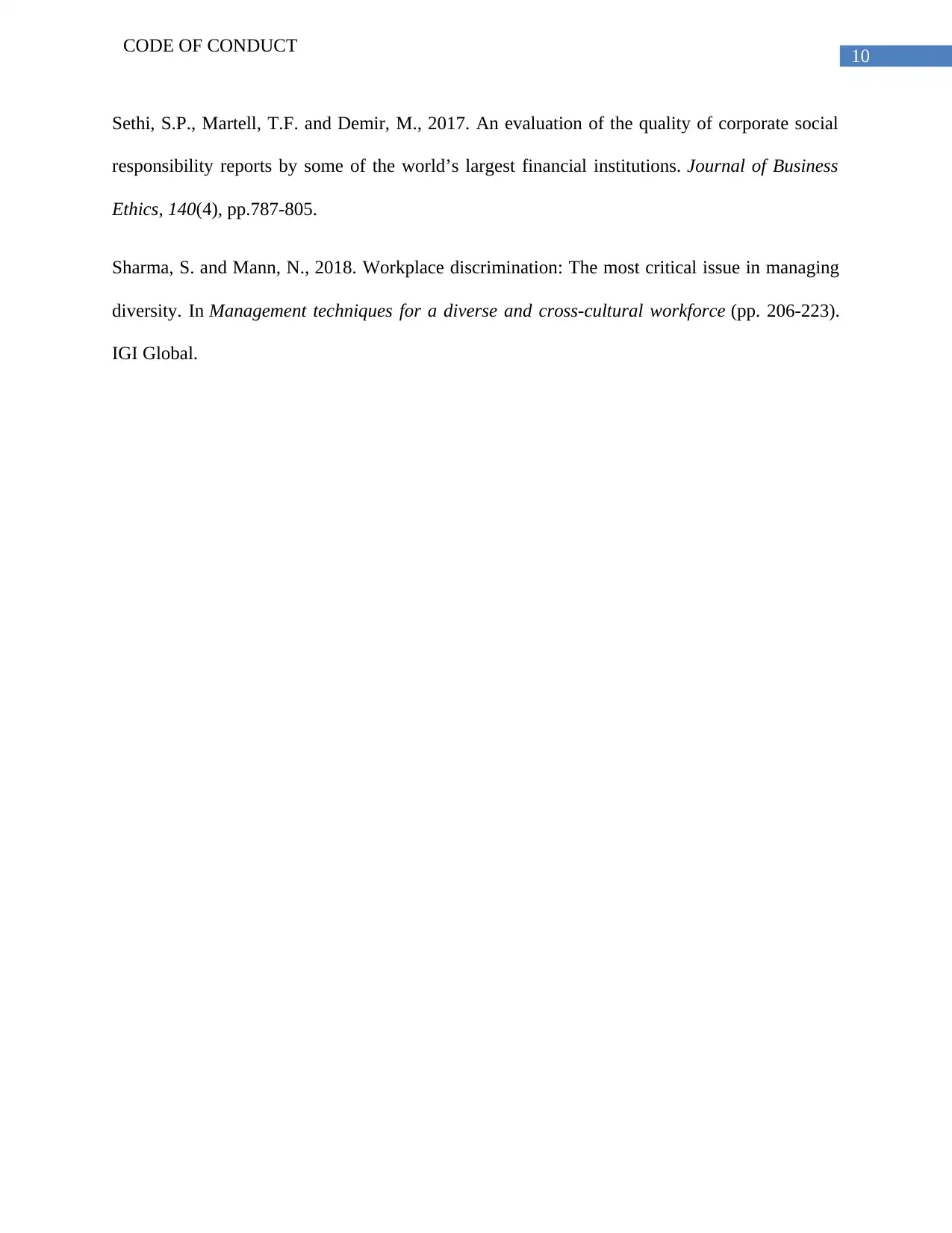
10
CODE OF CONDUCT
Sethi, S.P., Martell, T.F. and Demir, M., 2017. An evaluation of the quality of corporate social
responsibility reports by some of the world’s largest financial institutions. Journal of Business
Ethics, 140(4), pp.787-805.
Sharma, S. and Mann, N., 2018. Workplace discrimination: The most critical issue in managing
diversity. In Management techniques for a diverse and cross-cultural workforce (pp. 206-223).
IGI Global.
CODE OF CONDUCT
Sethi, S.P., Martell, T.F. and Demir, M., 2017. An evaluation of the quality of corporate social
responsibility reports by some of the world’s largest financial institutions. Journal of Business
Ethics, 140(4), pp.787-805.
Sharma, S. and Mann, N., 2018. Workplace discrimination: The most critical issue in managing
diversity. In Management techniques for a diverse and cross-cultural workforce (pp. 206-223).
IGI Global.
1 out of 11
Related Documents
Your All-in-One AI-Powered Toolkit for Academic Success.
+13062052269
info@desklib.com
Available 24*7 on WhatsApp / Email
![[object Object]](/_next/static/media/star-bottom.7253800d.svg)
Unlock your academic potential
© 2024 | Zucol Services PVT LTD | All rights reserved.





